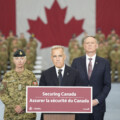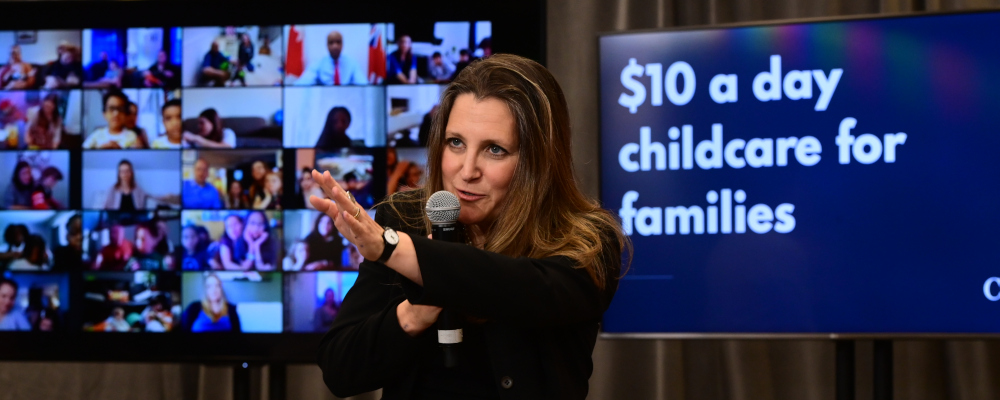Over the coming days, The Hub will publish mandate letters for the incoming cabinet ministers that set out a series of bold policy prescriptions that would cumulatively tilt Canadian politics towards a different and better future.
The best antidote to anger and frustration is aspiration and purpose. The campaign has demonstrated how urgently Canada’s body politic needs such a remedy. There’s no time to waste. It’s time to get to work.
Dear Minister of Finance,
I am honoured that you have agreed to serve Canadians as the Minister of Finance.
As you know, our government must have a both a short- and long-term orientation. The immediate priority is to help the country through the COVID-19 pandemic and to catalyse a post-pandemic recovery. Getting Canadian businesses and families to the other end of this crisis is the key to restoring stability and optimism in our economy and society.
Beyond that, though, over the long term, we face many opportunities and challenges including geopolitical instability, aging demographics, climate change, reconciliation with Indigenous peoples, long-term fiscal challenges, low productivity, and slow growth.
Each of these issues could easily consume a government’s attention, focus, and resources. But we do not have the luxury of prioritizing one or some of them. They require similar levels of energy and ambition if we are to lay the foundation for a different and better future for Canadians.
An emphasis on the future is a much-needed antidote to the growing anxiety and pessimism in our country. Even before the pandemic, too many Canadians worried that their children will not have the same opportunities and living standards as them. The pandemic has exacerbated these concerns and cast a pall of uncertainty over our economy and society.
In this context, Canadians have grown skeptical of the ability of government to put aside partisan differences or short-term political advantage and make the hard yet necessary choices to mitigate our long-term challenges and accentuate our opportunities. It is incumbent on us to prove to Canadians that their skepticism and doubt is unwarranted. We must rebuild their trust through our actions and choices.
This principle extends to all aspects of governance. Our government must live up to the highest ethical standards, including openness, honesty, and accountability. I expect you to reflect these values in your work. It is critical that we honour Canadians’ trust in us and the history and dignity of the institutions and roles that we occupy.
Our immediate policy priorities flow from the best ideas and rooted in evidence. As the Minister of Finance, I would ask that you work with your colleagues to deliver on the following key priorities:
- Expand the Canada Workers Benefit to increase the incentives for low-income workers to find and obtain employment by boosting their take-home pay.
- Conduct a thematic review of the federal tax code (e.g., housing, education, retirement savings, etc.) to eliminate, consolidate, and streamline tax expenditures in the name of improving the tax system’s efficiency, equity, and simplicity.
- As part of this exercise, consider shifting the unit of taxation from the individual to the household for the purpose of addressing horizontal inequities between households with the same level of income but different income distribution between household members.
- Experiment with wage subsidies to help workers with weak labour force attachment — including long-tenured unemployed, Indigenous peoples or refugees — to obtain employment.
- Consider reforms to the federal government’s system of fiscal federalism including its major transfer payments and possible tax swaps (e.g., eliminate the GST) with the provinces and territories that reflect the optimal incidence of different forms of taxation according to order of government.
- Establish a new, regularized process for “zero-based budgeting” that evaluates the efficacy of program spending relative to the cost of raising revenues or public borrowing.
- Control the rate of program spending growth to no faster than economic growth and population growth.
- Make progress towards eliminating the federal deficit and start to reduce the federal debt-to-GDP ratio over the medium-term.
- Enact Opportunity Zones to provide preferential capital gains tax policies for private investment in economically-distressed neighbourhoods and communities.
- Establish a multi-year, long-term growth strategy — including measurable targets — to guide policymaking and enable Canadians to track progress and hold the government accountable.
- Provide funding for a new common platform for standardizing interprovincial policy and regulatory divergences on an apples-to-apples basis (similar to the Canadian Institute for Health Information) in order to enable a process of harmonization and mutual recognition across provinces and territories.
- Eliminate the preferential tax rate for small businesses and in turn lower the lower general corporate tax to incentivize growth and scale.
I know I can count on you to fulfill these responsibilities and help to deliver a different and better future rooted in prosperity and opportunity for all Canadians.
Recommended for You

Trevor Tombe: How is Carney going to pay for his commitments? There are some tough choices ahead

Need to Know: Legacy media has a diversity problem

‘A celebration of the spirit of Alberta’: Ryan Hastman on the political, economic, and cultural importance of the Calgary Stampede

‘Can we actually be an independent country?’: Michael Ignatieff on the 60th anniversary of Lament for a Nation




